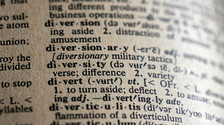azahrah.qolbaina
what the things that make verb 2 and verb 3 different
I was confised by verb 2 and verb 3. Can you explain it?
16 มี.ค. 2012 เวลา 11:16
คำตอบ · 3
What is verb 1?
16 มีนาคม 2012
It sounds like you're asking about patterns like "see - saw - seen", or (Brad's example) "go - went - gone".
Basically, the past participle ("verb 3") always needs a helping verb. Always. It can't function without one. So you can say "I have seen" or "it is gone", but "it gone" and "I seen" are completely wrong; you need "it went" and "I saw" (simple past) in these cases.
You use the past participle in perfect tenses (I have seen; I had eaten; I will have spoken), hypothetical forms using "have" (I should have known; it could have sunk), or passive forms (it is known; that was eaten).
Verb 2 (past simple) is the basic past tense of the verb.
16 มีนาคม 2012
Are you talking about the simple past (e.g., "went") vs. the past participle (e.g., "gone")?
16 มีนาคม 2012
ยังไม่พบคำตอบของคุณใช่ไหม
เขียนคำถามของคุณเพื่อให้เจ้าของภาษาช่วยคุณ!
azahrah.qolbaina
ทักษะด้านภาษา
ภาษาอาหรับ, ภาษาอังกฤษ, ภาษาอินโดนีเซีย, ภาษาตุรกี
ภาษาที่เรียน
ภาษาอาหรับ, ภาษาอังกฤษ, ภาษาตุรกี
บทความที่คุณอาจชอบ

Top 6 Mistakes to Avoid with Vocabulary Acquisition
38 ถูกใจ · 10 ความคิดเห็น

Navigating Your First Job: Do's and Don'ts in the Workplace
47 ถูกใจ · 21 ความคิดเห็น

What Content to Watch to Acquire Advanced-level Proficiency
79 ถูกใจ · 50 ความคิดเห็น
บทความเพิ่มเติม
